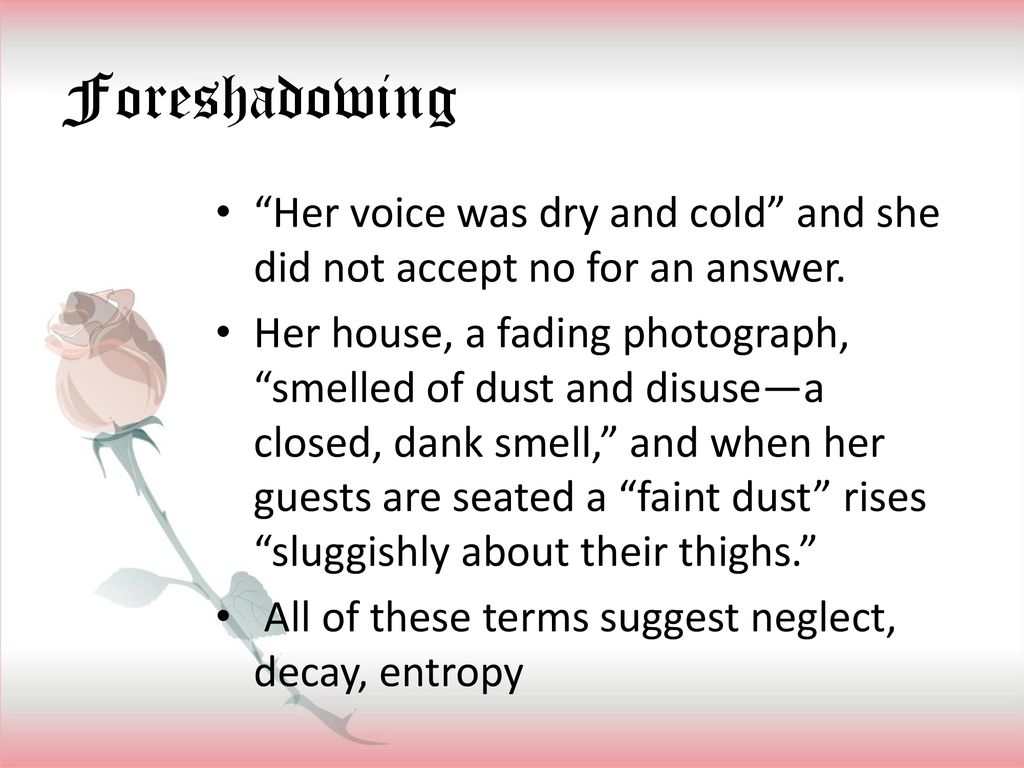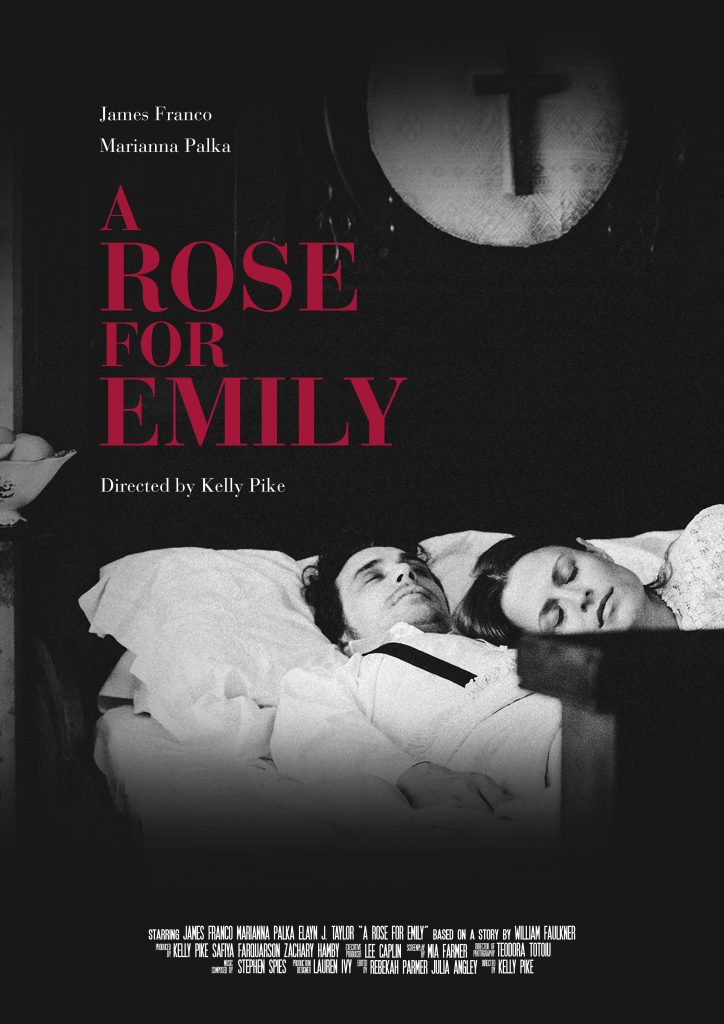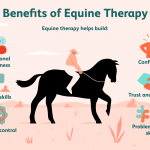“A Rose for Emily” is a short story by William Faulkner, first published in the April 30, 1930 issue of the magazine Forum. The story is set in Faulkner’s fictional city, Jefferson, Mississippi, in the fictional southern county of Yoknapatawpha. It tells the story of Emily Grierson, a spinster whose father dies, leaving her alone with a large estate and no suitors. The story follows the decline of Emily and her eventual death, and the effects of her changes on the town. The story is famous for its opening line, “When Emily Grierson died, our whole town went to her funeral: the men through a sort of respectful affection for a fallen monument, the women mostly out of curiosity to see the inside of her house, which no one save an old manservant—a combined gardener and cook—had seen in at least ten years.” This line captures the enigma that is Emily, and how her life and death are intertwined with the history of her town and its inhabitants.
56 Best A Rose For Emily Quotes

-
“Alive, Miss Emily had been a tradition, a duty, and a care; a sort of hereditary obligation upon the town”
– William Faulkner
-
“The men through a sort of respectful affection for a fallen monument, the women mostly out of curiosity to see the inside of her house”
– William Faulkner
-
“So she vanquished them, horse and foot, just as she had vanquished their fathers thirty years before about the smell”
– William Faulkner
-
“The neighborhood had become accustomed to her and she was not a problem to them”
– William Faulkner
-
“The old people said, ‘Poor Emily.’”
– William Faulkner
-
“Emily Grierson, the object of curiosity in the town”
– William Faulkner
-
“She had become a memory”
– William Faulkner
-
“The day after his death all the ladies prepared to call at the house and offer condolence and aid, as is our custom”
– William Faulkner
-
“The Griersons held their heads high, when all of the death and humility of the town came about”
– William Faulkner
-
“Emily had become a kind of hereditary obligation upon the town”
– William Faulkner
-
“The men through a sort of respectful affection for a fallen monument, the women mostly out of curiosity to see the inside of her house”
– William Faulkner
-
“So she vanquished them, horse and foot, just as she had vanquished their fathers thirty years before about the smell”
– William Faulkner
-
“The neighborhood had become accustomed to her and she was not a problem to them”
– William Faulkner
-
“The old people said, ‘Poor Emily.’”
– William Faulkner
-
“Emily Grierson, the object of curiosity in the town”
– William Faulkner
-
“She had become a memory”
– William Faulkner
-
“She was an emblem of the old times”
– William Faulkner
-
“A kind of hereditary obligation upon the town”
– William Faulkner
-
“But it was a duty”
– William Faulkner
-
“We remembered all the young men her father had driven away, and we knew that with nothing left, she would have to cling to that which had robbed her”
– William Faulkner
-
“They said she had gone completely crazy”
– William Faulkner
-
“The two female cousins came at once and held the funeral”
– William Faulkner
-
“It was another link with the past, and a mute gospel”
– William Faulkner
-
“The town could not keep from listening to the old whisper that crept out of her lips”
– William Faulkner
-
“We had long thought of them as a tableau; Miss Emily a slender figure in white in the background, her father a spraddled silhouette in the foreground, his back to her and clutching a horsewhip”
– William Faulkner
-
“The day after his death all the ladies prepared to call at the house and offer condolence and aid, as is our custom”
– William Faulkner
-
“She had become a sort of genius of tragedy”
– William Faulkner
-
“The Griersons held their heads high, when all of the death and humility of the town came about them”
– William Faulkner
-
“The ladies all said, ‘Of course she had to do something’”
– William Faulkner
-
“They did not say she was crazy then”
– William Faulkner
-
“We remembered all the young men her father had driven away, and we knew that with nothing left, she would have to cling to that which had robbed her”
– William Faulkner
-
“They said she willed away and got sick after her father’s death and never was the same”
– William Faulkner
-
“She passed from generation to generation–dear, inescapable, impervious, tranquil, and perverse”
– William Faulkner
-
“People in our town, remembering how old lady Wyatt, her great-aunt, had gone completely crazy at last, believed that the Griersons held themselves a little too high for what they really were”
– William Faulkner
-
“The men through a sort of respectful affection for a fallen monument, the women mostly out of curiosity to see the inside of her house”
– William Faulkner
-
“And we knew that with nothing left, she would have to cling to that which had robbed her, as people will”
– William Faulkner
-
“People in our town, remembering how old lady Wyatt, her great-aunt, had gone completely crazy at last, believed that the Griersons held themselves a little too high for what they really were”
– William Faulkner
-
“She carried her head high enough–even when we believed that she was fallen”
– William Faulkner
-
“The old people said, ‘Poor Emily.’”
– William Faulkner
-
“The Griersons had once been a part of the aristocracy, but that was long ago”
– William Faulkner
-
“Alive, Miss Emily had been a tradition, a duty, and a care; a sort of hereditary obligation upon the town”
– William Faulkner
-
“We had long thought of them as a tableau–Miss Emily a slender figure in white in the background, her father a spraddled silhouette in the foreground, his back to her and clutching a horsewhip”
– William Faulkner
-
“The day after his death all the ladies prepared to call at the house and offer condolence and aid, as is our custom”
– William Faulkner
-
“They had forgotten Miss Emily entirely”
– William Faulkner
-
“The day after his death all the ladies prepared to call at the house and offer condolence and aid, as is our custom”
– William Faulkner
-
“Alive, Miss Emily had been a tradition, a duty, and a care; a sort of hereditary obligation upon the town”
– William Faulkner
-
“The two female cousins came at once and held the funeral”
– William Faulkner
-
“We believed she had to do that which was closest to her, and we remembered, too, the old saying, ‘That which will not kill us makes us stronger”
– William Faulkner
-
“The women mostly out of curiosity to see the inside of her house”
– William Faulkner
-
“The Griersons held their heads high, when all of the death and humility of the town came about them”
– William Faulkner
-
“The ladies all said, ‘Of course she had to do something’”
– William Faulkner
-
“It was another link with the past, and a mute gospel”
– William Faulkner
-
“The town had just let her alone”
– William Faulkner
-
“The old people said, ‘Poor Emily’”
– William Faulkner
-
“We believed she had to do that which was closest to her, and we remembered, too, the old saying, ‘That which will not kill us makes us stronger”
– William Faulkner
-
“People in our town, remembering how old lady Wyatt, her great-aunt, had gone completely crazy at last, believed that the Griersons held themselves a little too high for what they really were”
– William Faulkner
Conclusion
The quotes from “A Rose for Emily” are steeped in symbolism and evoke a range of emotions from sorrow to joy. Through its characters and situations, this short story tells a timeless tale of love and loss, of acceptance and rejection, and of the power of the past. This story has resonated for generations and these quotes will continue to inspire and remind readers of the importance of embracing the past, even during times of change.






